Half of all France's teachers, some 400,000 throughout the national school system, struck and up to 200,000 took to the streets in a hundred cities last Thursday in the fourth day of action in education in two months. Some teachers from the private sector also participated.
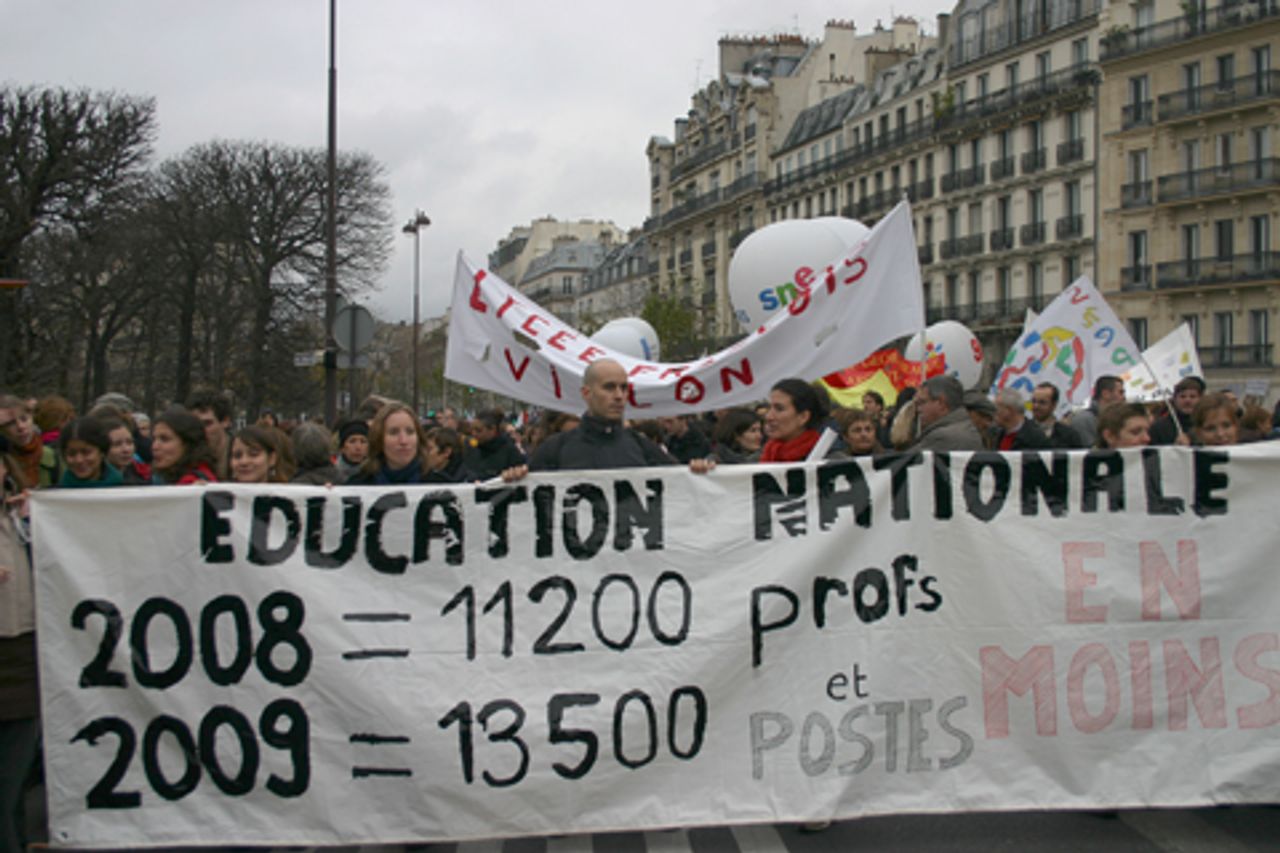 The strike was called by all the education unions to protest cuts in education by the government of President Nicolas Sarkozy, including the slashing of teaching posts. They were joined by high school and university students as well as parents.
The strike was called by all the education unions to protest cuts in education by the government of President Nicolas Sarkozy, including the slashing of teaching posts. They were joined by high school and university students as well as parents.
Having cut 11,200 teaching posts in 2008, Education Minister Xavier Darcos proposes to cut a further 13,500 in 2009. The elimination of 3,000 RASED (Les Réseaux d'Aides Spécialisées aux Elèves en Difficulté—Network of Aid to Pupils in Difficulty) positions has especially incensed primary school teachers. In the lycées (high schools), teachers and pupils are concerned by the reduction of teaching hours dedicated to various subject matters, which enables the government to eliminate posts.
Darcos has issued a series of statements implying that there are too many teachers with too much training. He has suggested that there is no need for post-university training to look after children in infant schools, where free public education starts often before the age of two. He proclaimed, "teachers don't need five years [of training] after the baccalauréat to supervise children's siesta or to change nappies."
In a provocative statement on Thursday he added, "The question is not to know how many they are but how they're doing. The graphs which interest me are those of results, not those of teacher numbers."
Such statements are in line with the policies of Sarkozy, who wrote in a letter addressed to teachers in 2007: "In the education system I'm calling for, where quality will have priority over quantity, where there will be shorter class time, where resources will be better used ... teachers will be less numerous."
A sinister aspect of the day of action was the government attempt to enforce a law requiring the provision of supervision by local councils for primary pupils whose teachers are on strike—the SMA (Service minimum d'accueil—Minimum Supervision Service). Local councils run by Socialist and Communist Party majorities have largely refused to take on this responsibility. Darcos has threatened recalcitrant councils with sanctions. However, attempts by local préfets to take legal action against councils have so far been rejected by the courts. Councils run by the ruling UMP (Union for a Popular Movement) have provided the service with employees who have no qualifications for looking after young children.
Over the past decade, there has been a series of massive movements against attacks on education by successive governments. The unions have acted to stifle, isolate and fragment these movements, from Claude Allègre (Education Minister in the Plural Left government of Lionel Jospin) and his project of "cutting the fat from the mammoth," through the defeat of the six-week-long strike in 2003 in defence of pensions. This was followed in 2006 by opposition to the so-called Equal Opportunities Law in the anti-CPE (First Job Contract) movement, and then the succession of separate days of action by the unions since the election of Sarkozy in May 2007.
The major education trade union body, the FSU (Unitary Union Federation) which has links with the Communist Party (PCF), bears the primary responsibility for this, in alliance with the CGT (General Confederation of Labour, close to the PCF), the CFDT (French Democratic Confederation of Labour, close to the Socialist Party), FO (Force Ouvrière) and UNSA (National Union of Autonomous Trade Unions, close to the Socialist Party.)
The NPA (New Anti-capitalist Party) of Olivier Besancenot issued a leaflet that made no reference to the betrayals of the trade unions or to the economic crisis, and gave no socialist perspective for the overthrow of capitalism. It merely stated that the November 20 strike must provide "an opportunity to build a convergence of action, between staff and the public, for the defence of the public services."
All of the unions have been collaborating closely with Sarkozy and his ministers since his election. The latest strike is one of a long series of carefully separated protests aimed at preventing numerous ongoing strike struggles from coalescing into a unified movement against the government.
This week is a prime example. On Monday, Air France pilots were on the fourth and last day of their strike against the raising of their retirement age from 60 to 65. On Saturday postal workers will also demonstrate against privatisation, closures and deteriorating working conditions.
On Tuesday a section of the train drivers were due to be called out on strike against attacks on working conditions in the freight division, a preparation for the privatisation and break-up of the entire national rail service. This has been postponed until Friday, pending negotiations.
Other rail drivers' unions are calling out their supporters on the issue on Sunday in an open-ended strike. However, the trade unions are limiting their strike calls to the drivers and not calling out all 160,000 railway workers, let alone in a unified strike of all affected sectors against the government's austerity policies.
The large support for Thursday's action is a measure of the anger felt by millions of workers and youth. As they marched, the stock exchanges throughout the world were in freefall; the French CAC-40 lost over 5 percent of its value. France is suffering widespread closures, layoffs and sackings in the motor, steel, road transport and other industries.
The ruling class is being obliged to accelerate and deepen its inroads into workers' living standards in order to maintain its wealth. While the government refuses to find more funds for education with a budget of €59 billion, it found €360 billion to bail out the banks and big businesses.
Teams of reporters from the World Socialist Web Site intervened in the demonstrations in Paris and Amiens.
In Paris up to 40,000 demonstrators, mainly teachers accompanied by significant contingents of high school and university students, demanded the withdrawal of Darcos' reform programme.
Teachers from the Newton Lycée marched behind a banner proclaiming: "The Darcos reform = the end of equality of opportunity." Frank, holding one side of the banner, said, "I'm here to oppose the 90,000 posts suppressed over six years."
He spoke of eight teacher retirees not being replaced at his school. His school has been hit by the elimination of the catchment areas requiring pupils to attend their neighbourhood school. Thirty pupils who had opted out had not been accepted into other over-subscribed schools. His school had been obliged to take them in, swelling already excessive class sizes.
Frank said, "Since 2003 everything has been pulled downwards. Left and right are all subject to the laws of the market. I'm for the nationalisation of the economy. All the plans to rescue the economy are a vast swindle."
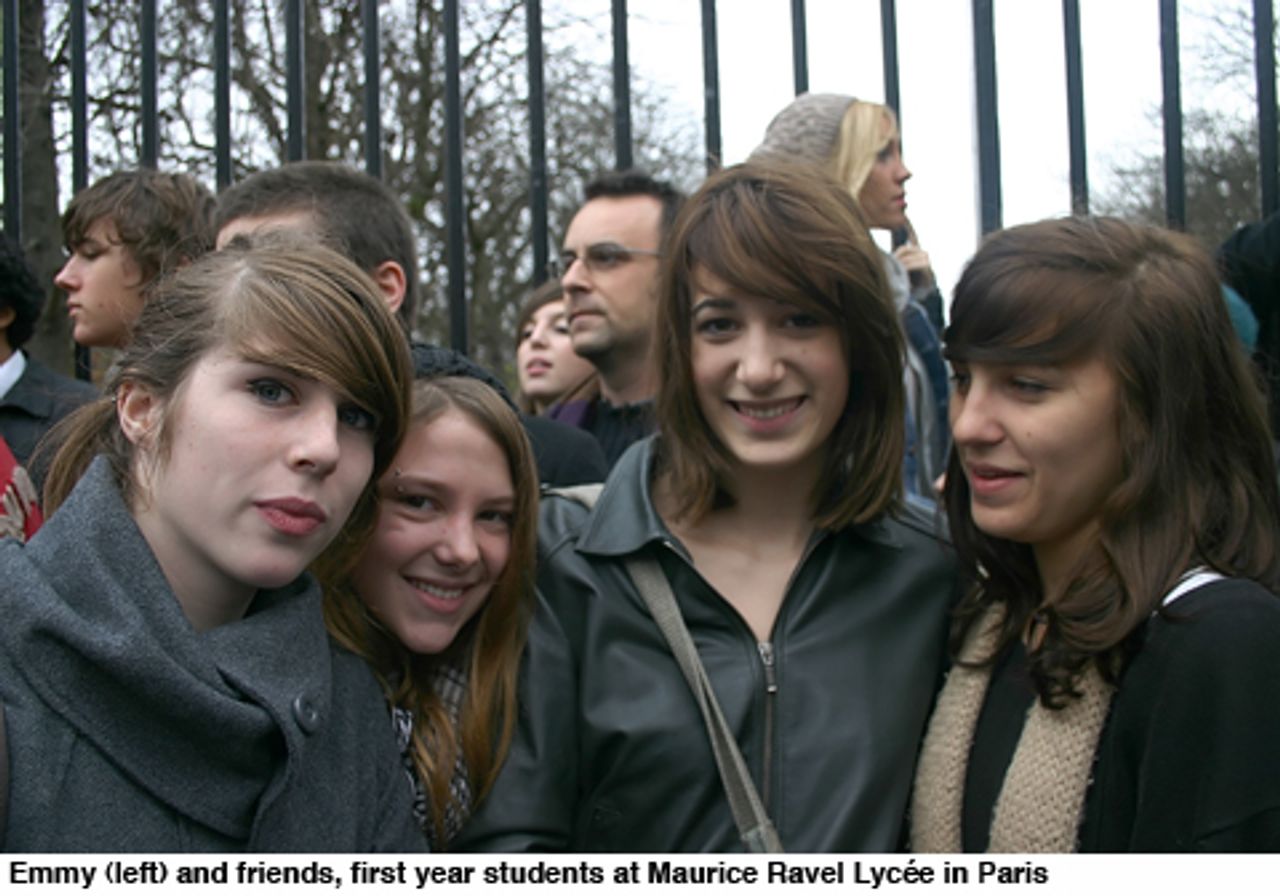 Emmy and her friends, first year students at Maurice Ravel Lycée in Paris, said that they thought the future for young people was very bleak. "Qualifications are worth less and less," said Emmy. "It's the American model. We want a good general education. The reform is going to create two sorts of lycées—good ones and bad ones."
Emmy and her friends, first year students at Maurice Ravel Lycée in Paris, said that they thought the future for young people was very bleak. "Qualifications are worth less and less," said Emmy. "It's the American model. We want a good general education. The reform is going to create two sorts of lycées—good ones and bad ones."
"The crisis should hit the bankers, not ordinary people," she said.
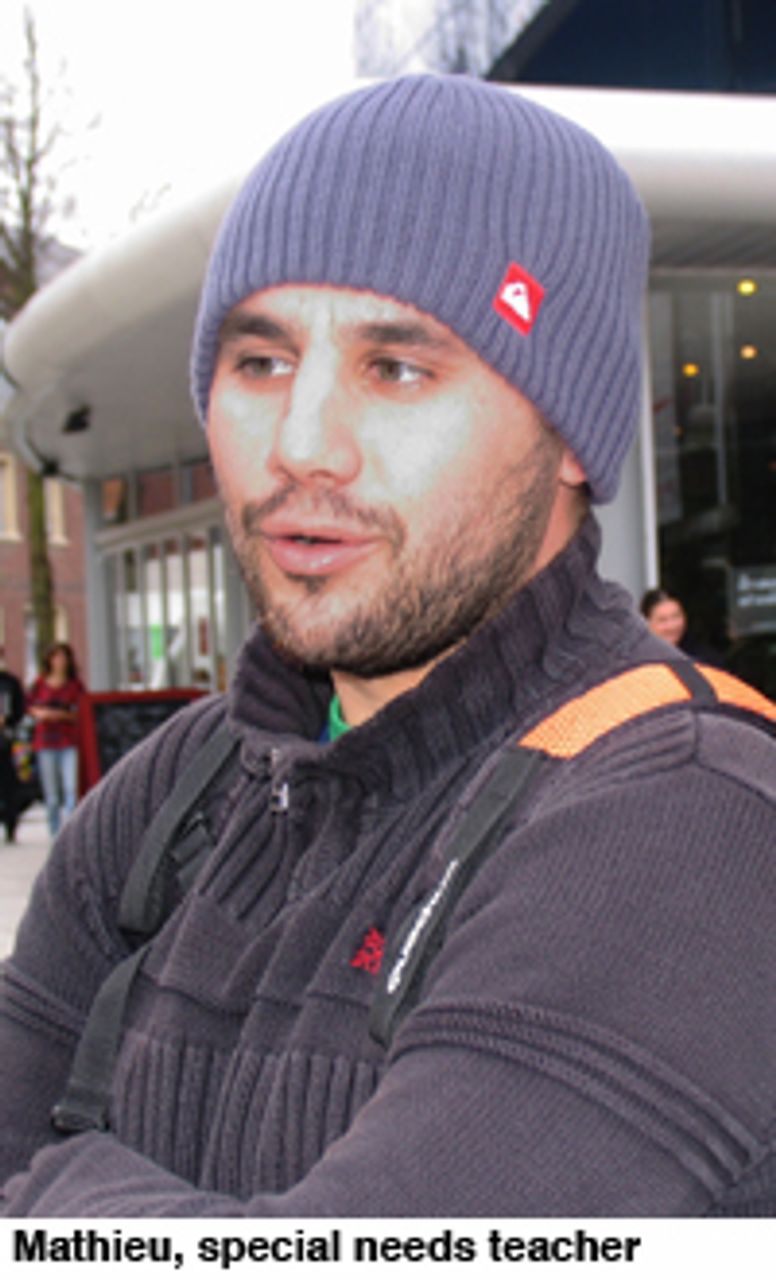 Eva and Anita, studying law at Paris 2 University, were most worried about staff cuts. Eva said, "Left and right governments make their policies, but there's no questioning of the capitalist system, based on profit. They keep the system going."
Eva and Anita, studying law at Paris 2 University, were most worried about staff cuts. Eva said, "Left and right governments make their policies, but there's no questioning of the capitalist system, based on profit. They keep the system going."
Anita added, "We're going to have to think about what could replace it."
In Amiens, 3,000 took part in the demonstration.
An NPA leaflet denouncing the loss of 6,000 teachers' jobs this year made no political demands, demanding only: "Vote the continuation of the strike ... the trial of strength must continue until other sections are involved."
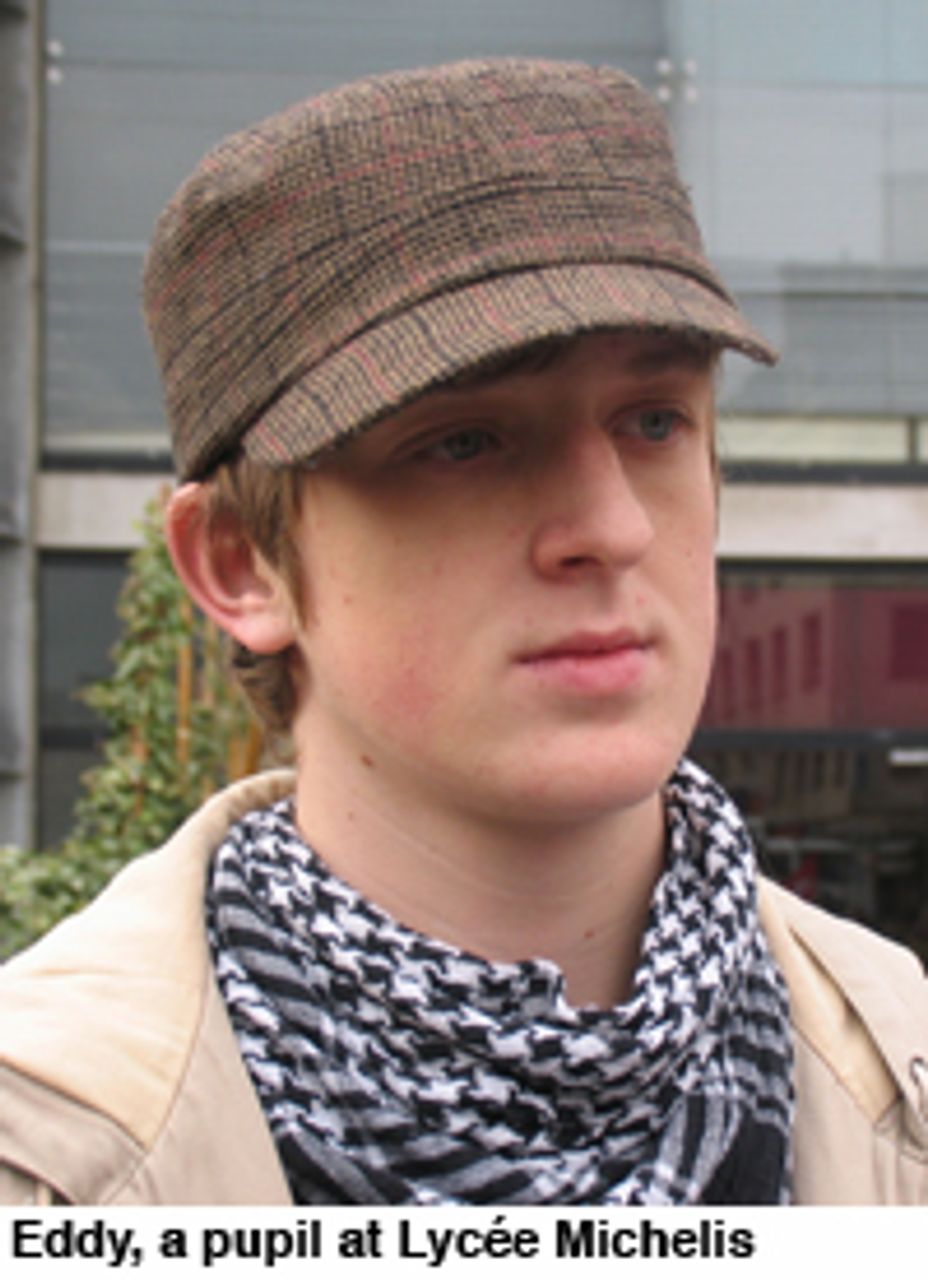 Mathieu, a teacher for children with special needs, said such children in deprived areas were in danger because of the cuts in teaching posts. "I don't belong to any union, but Marx was right about the economic crisis of capitalism. I think a lot of people are realising this. We need a real economic change before a political change."
Mathieu, a teacher for children with special needs, said such children in deprived areas were in danger because of the cuts in teaching posts. "I don't belong to any union, but Marx was right about the economic crisis of capitalism. I think a lot of people are realising this. We need a real economic change before a political change."
Eddy, a high school student at Lycée Michelis in Amiens, said, "In order to defend jobs French people must mobilise and sackings must be banned by law if companies make profits. And dividends must be shared with workers. Wages must be increased as much as those of employers."
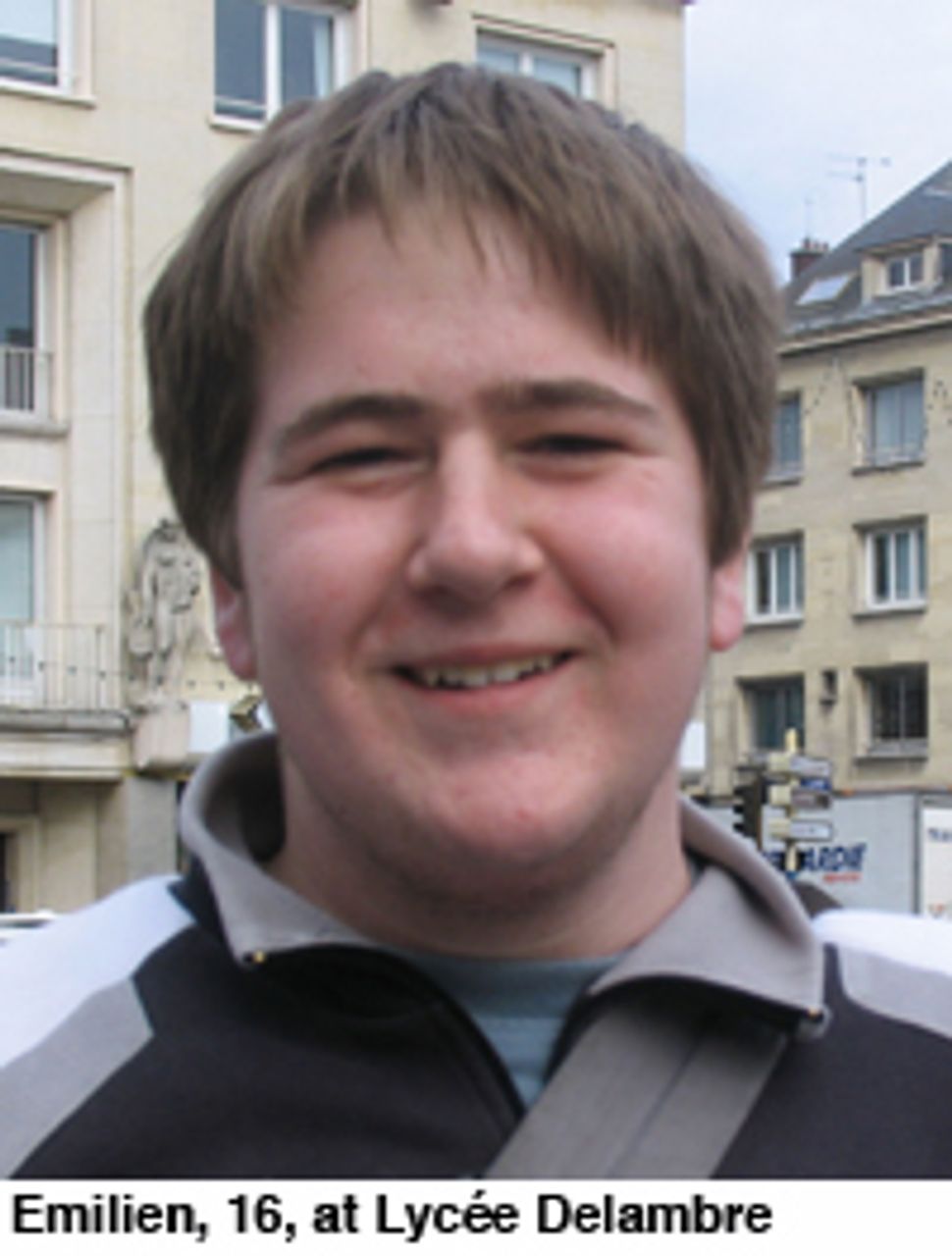 Emilien, 16, from Lycée Delambre, said, "We need a referendum to get this government out. Thirty students in a class is not acceptable. This is capitalism and the Socialist Party is breaking apart, while the PCF is no longer worth anything. As for Olivier Besancenot, he is not credible. We have to unite because in times of crisis foreigners become the scapegoats for social problems."
Emilien, 16, from Lycée Delambre, said, "We need a referendum to get this government out. Thirty students in a class is not acceptable. This is capitalism and the Socialist Party is breaking apart, while the PCF is no longer worth anything. As for Olivier Besancenot, he is not credible. We have to unite because in times of crisis foreigners become the scapegoats for social problems."
